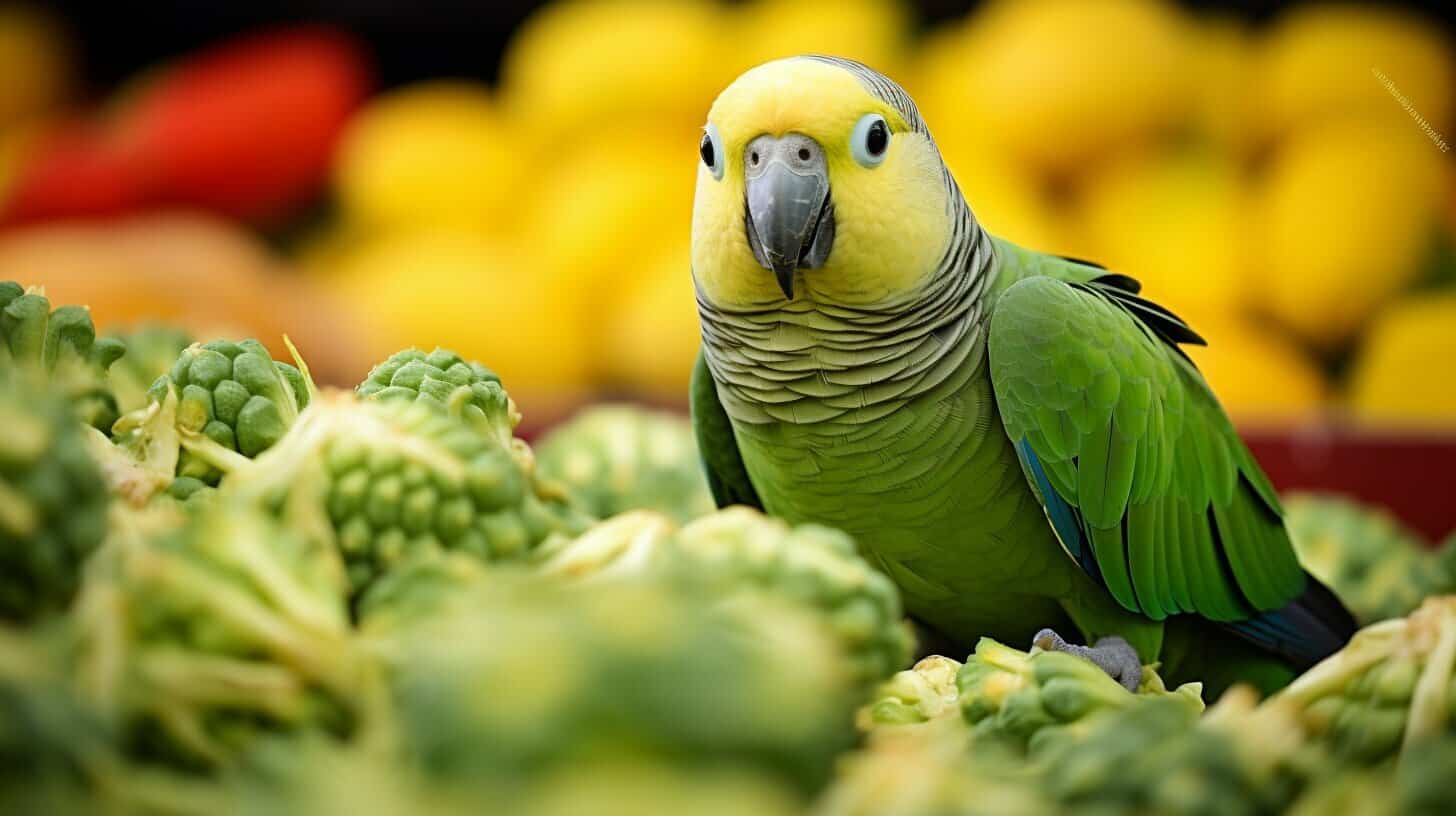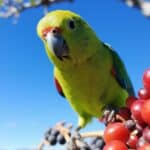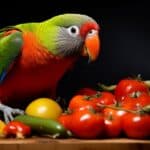If you’re a kakariki owner, you may be wondering whether or not broccoli is a safe and healthy food for your bird. In this section, we’ll explore whether kakarikis can eat broccoli and provide a comprehensive nutritional guide for your feathered friend.
Can kakarikis eat broccoli? Yes, kakarikis can eat broccoli. Broccoli is a nutritious vegetable that many birds, including kakarikis, find beneficial. It’s rich in vitamins and minerals essential for their health. It’s best to provide broccoli raw or lightly steamed to retain its nutritional value. Like with all foods, it should be introduced gradually and always ensure it’s fresh and free from pesticides. Monitor your kakarikis to ensure they’re enjoying it without any adverse reactions.
Kakarikis are omnivorous birds requiring a mix of plant-based foods and small amounts of protein. Before diving into broccoli as a potential food for kakarikis, it’s crucial to understand their dietary preferences. They primarily feed on fruits, vegetables, seeds, and insects. Knowing this information will help us determine how broccoli fits into their overall diet.
Key Takeaways:
- Kakarikis are omnivorous birds that require a mix of plant-based foods and small amounts of protein.
- Broccoli can be a healthy addition to a kakariki’s diet when provided in moderation.
- It’s important to offer a variety of safe vegetables to maintain a balanced nutrition for your bird.
- Regularly monitor your kakariki’s health when introducing new foods like broccoli.
Understanding Kakariki Dietary Preferences
Before adding broccoli to your kakariki’s diet, it’s important to know what foods your bird prefers and needs. Kakarikis are omnivorous, requiring a mix of plant-based foods and protein.
For a healthy balance, they include fruits, vegetables, seeds, and insects. While some foods are safe for kakarikis, others may be harmful. Avoid feeding your bird avocado, chocolate, caffeine, alcohol, and sugary or salty foods, as they can negatively affect their health.
When feeding your kakariki vegetables, it’s best to provide various safe options to avoid nutritional deficiencies. Leafy greens like spinach and kale, carrots, bell peppers, and peas are great options.
Protein is also important for kakarikis but should be provided in small amounts. Cooked chicken, hard-boiled eggs, and small amounts of cheese or tofu can be included in their diet.
Remember always to provide fresh water for your bird and avoid offering any food that is spoiled or contaminated.
Broccoli as a Kakariki Diet
Broccoli is a nutritious vegetable that can be a healthy addition to your kakariki’s diet. It contains essential nutrients such as vitamin C, which is important for their overall health and immune system. Additionally, the dietary fiber in broccoli promotes healthy digestion in these birds.
However, it’s important to note that broccoli should be provided in moderation and as part of a diverse diet. Overfeeding broccoli, or any single food item, can lead to imbalances in their nutritional intake.
When introducing broccoli into your kakariki’s diet, start by offering small, bite-sized pieces and observe their response. Some birds may take to it immediately, while others may need time to adjust to the new food. Always ensure the broccoli is fresh, thoroughly washed, and free from pesticides or harmful chemicals.
Nutritional Benefits of Broccoli for Kakarikis
Broccoli is an excellent source of essential nutrients that can benefit your kakariki’s health. Here are some of the nutritional benefits of feeding your bird broccoli:
| Nutrient | Function |
|---|---|
| Vitamin C | Important for overall health and immune system. Helps in the absorption of iron and aids in collagen production. |
| Vitamin K | Essential for blood clotting and bone health. |
| Dietary fiber | Promotes healthy digestion and can aid in weight management. |
| Calcium | Important for bone and beak health. |
| Iron | Essential for healthy blood cells and overall growth. |
Broccoli can provide your kakariki with a range of essential nutrients, but it should be fed in moderation as part of a diverse diet. Overfeeding broccoli or any single food item can cause imbalances in their nutritional intake, leading to potential health issues. Ensure that your kakariki’s diet includes a variety of safe vegetables and foods that meet their unique nutritional needs.
Incorporating Broccoli into the Kakariki Diet
Now that you know that broccoli can be a healthy addition to your kakariki’s diet, it’s time to introduce it gradually. Start by offering small, bite-sized pieces and observe their response. Some birds may take to it immediately, while others may need time to adjust to the new food. Always ensure the broccoli is fresh, thoroughly washed, and free from pesticides or harmful chemicals.
If you notice that your bird is not interested in broccoli, try mixing it with other foods they enjoy. You can also try cooking or steaming the broccoli to make it more appetizing.
Remember that broccoli and other safe vegetables and foods should be provided in moderation to maintain a diverse diet. Some other safe vegetables for kakarikis include leafy greens like spinach and kale, carrots, bell peppers, and peas. Experiment with different vegetables and observe your bird’s preferences.
Regularly monitoring your kakariki’s health is essential when introducing new foods like broccoli. Keep an eye on their droppings, energy levels, and overall behavior. If you notice any sudden changes, consult an avian veterinarian for guidance. Remember that every bird is unique, and their dietary needs may vary.
Other Safe Vegetables for Kakarikis
In addition to broccoli, there are other safe vegetables that you can incorporate into your kakariki’s diet. Leafy greens like spinach and kale are rich in essential vitamins and minerals. Bell peppers and carrots are great sources of vitamin A, which is crucial for maintaining good vision and a healthy immune system. Peas are also a good option as they are a good source of protein.
It’s important to offer a variety of vegetables to maintain a balanced nutrition. Experiment with different types of vegetables and observe your bird’s preferences. You can offer them raw, steamed, or lightly cooked. However, avoid cooking them in oil or seasoning them with salt or sugar as it can be harmful to your bird’s health.
Monitoring Kakariki Health
When feeding your kakariki broccoli or any new food, monitoring their health regularly is crucial. Keep a close eye on their droppings, energy levels, and overall behavior.
If you notice any sudden changes in their droppings, such as a change in color or consistency, it could indicate a health issue. Reduced energy levels or changes in behaviour may also indicate something is wrong.
It’s important to consult an avian veterinarian if you have any concerns about your bird’s health. They will be able to advise you on the best course of action and provide any necessary treatment.
Remember, every bird is unique, and their dietary needs may vary. By monitoring your kakariki’s health regularly, you can ensure they stay happy and healthy for years to come.
Conclusion
Now that you know that kakarikis can eat broccoli, you can add this nutritious vegetable to their meals. Remember to introduce it gradually and in moderation, alongside other safe vegetables and foods. Ensure the broccoli is fresh, washed thoroughly, and free from harmful chemicals. Observing your bird’s response and overall health is crucial when introducing new foods like broccoli.
Additionally, it’s important to maintain a balanced diet that includes a variety of safe vegetables like spinach, kale, carrots, bell peppers, and peas. Experiment with different vegetables and observe your bird’s preferences. Regularly monitoring their health and behaviour is essential in ensuring they stay healthy and happy. If you notice any changes in their droppings, energy levels, or behaviour, consult an avian veterinarian for guidance. Remember that every bird is unique, and their dietary needs may vary.
FAQ
Q: Can kakarikis eat broccoli?
A: Broccoli can be a healthy addition to a kakariki’s diet.
Q: What are the nutritional benefits of broccoli for kakarikis?
A: Broccoli is rich in essential nutrients such as vitamin C, vitamin K, and dietary fiber.
Q: How should I incorporate broccoli into my kakariki’s diet?
A: Start by offering small, bite-sized pieces of fresh broccoli and observe their response.
Q: Are there any other safe vegetables for kakarikis?
A: Yes, other safe vegetables for kakarikis include leafy greens, carrots, bell peppers, and peas.
Q: How should I monitor my kakariki’s health when introducing broccoli?
A: Regularly monitor your kakariki’s droppings, energy levels, and overall behavior. Consult a avian veterinarian if you notice any sudden changes.
Q: Can kakarikis eat broccoli as their main food?
A: No, broccoli should be provided in moderation as part of a diverse diet.
Q: What should I do if my kakariki doesn’t like broccoli?
A: If your kakariki isn’t interested in broccoli, try offering different vegetables and observe their preferences.
Q: Can I give my kakariki broccoli every day?
A: It is recommended to offer broccoli and other vegetables in moderation to prevent imbalances in their nutritional intake.



Have comments or questions about this article? Then get involved!
Spotted an error or something we have missed? Let us know